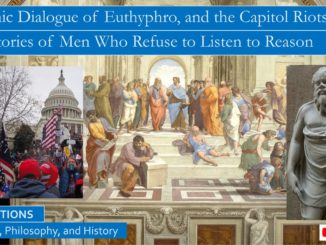
Trial of Socrates in Apology and Crito, Blog 1
How do you encourage your neighbor to grow in wisdom without preaching to him? The Platonic method is the dialectic, the Socratic Dialogue, questions and answers to encourage the citizen to think. The method used by the Gospels is the parable, similar in function to the Delphic Oracle, that also entices the listener to think through questions of right and wrong, justice and virtue. Plato does not use parables as often, but he does use parables very effectively, the most famous parable in the history of philosophy is his Allegory of the Cave in the Republic. […]


